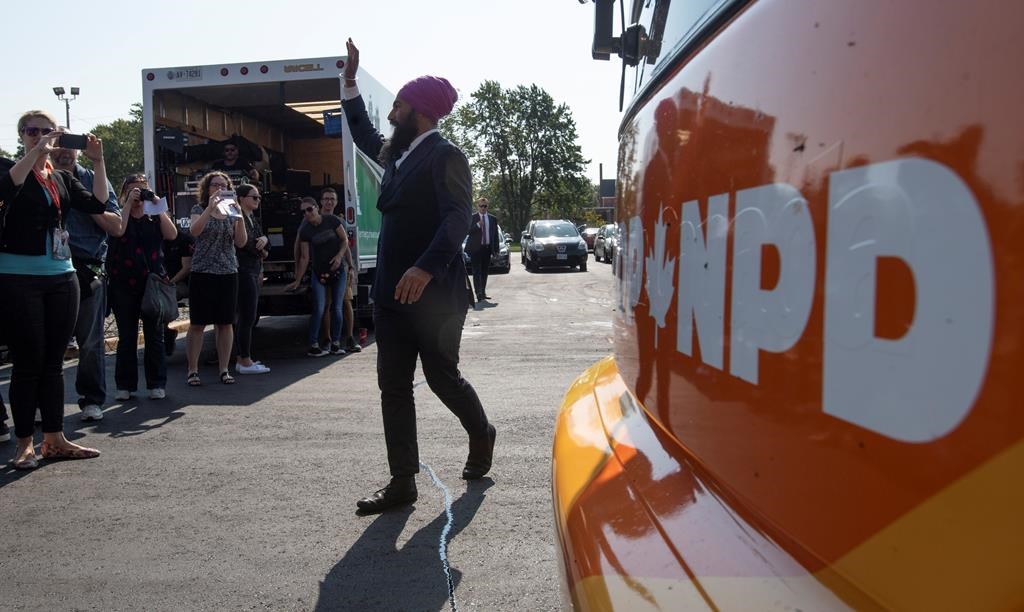On a campaign swing through British Columbia — a province where 90 per cent believe money laundering is a problem according to a recent poll — NDP Leader Jagmeet Singh has promised to deliver housing affordability measures including a new RCMP anti-money laundering unit.

Singh announced Wednesday the NDP would fund a dedicated RCMP anti-money laundering unit at a cost of $20 million. This would involve re-assigning some officers from the resource-starved federal RCMP ranks to the proposed unit, but also funding additional officers, according to the party.
Also, the envisioned unit would be expected to help seize the proceeds of real estate money laundering, and funnel the money mostly back into B.C. to fund affordable homes, party officials told Global News.
Singh said that, similar to the plan already promised by Conservative Leader Andrew Scheer, the NDP would support a national inquiry into money laundering.
However, Singh did not detail the costs of such an inquiry.
Another part of Singh’s plan would be to create a national registry to disclose the names of beneficial owners using shell companies to hide their investments in real estate. This is a measure supported by international anti-money laundering bodies, and adopted by the United Kingdom.
Singh’s proposals align with the position of the B.C. NDP provincial government and its attorney general, David Eby.
WATCH (Sept. 13, 2019): Liberal party Leader Justin Trudeau says his party is working with B.C. to address money laundering

Cities such as Vancouver and Toronto have major problems with opaque ownership of real estate, which fuels speculation and money laundering, according to studies from Transparency International Canada (TIC). A 2016 study for TIC found that about 50 per cent of Vancouver’s most expensive properties are owned through murky structures such as legal trusts and shell corporations.
B.C.’s government has responded to TIC’s recommended solutions, with plans for a provincial beneficial ownership registry.

Get daily National news
But because provinces and the federal government have different registration systems for land titles and corporations, the devil could be in the details, experts said.
TIC’s executive director James Cohen says that B.C. and other provinces need to align with the federal government in a searchable national registry.
“On the NDP’s proposal, it sounds ambitious, and if they have a mechanism for beneficial ownership transparency on land titles that would by-pass provinces, then why not propose a full, publicly-accessible, corporate-beneficial ownership registry?” Cohen said.
WATCH (May 16, 2019): NDP MP Peter Julian criticizes the ‘epidemic’ of money laundering in Canada under the Liberal government

Anti-money-laundering lawyer Christine Duhaime also said provinces would need to work with the federal government.
“It is the provincial corporate system that has been abused with shell companies, not federal, so a federal system would only capture companies set up federally and not too many people set up federal companies compared to the number set up in B.C.,” Duhaime said.
RCMP officers
According to findings from the B.C. NDP government, the RCMP currently has no dedicated federal anti-money laundering officers in the province. And an expert panel commissioned by the provincial government estimated about $7 billion was laundered in B.C. last year, and dirty cash is pushing up the prices of homes. The panel found that $50 billion could be laundered across Canada per year.
In an op-ed last week, Eby said that no matter which party wins the federal election, the next government must increase resources to fight money laundering — and in B.C., especially.
Duhaime said the NDP’s plan for a dedicated RCMP money laundering unit is “definitely needed in Vancouver and would be a positive step forward.”
But in order to be effective, such a unit would need to be permanent, “and to tackle money laundering issues across the province that affect not just real estate, but other areas as well, such as drug trafficking and digital currency fraud,” Duhaime said.
Cohen also said the RCMP money laundering unit plan needs to be broadly focused.
“On RCMP anti-money laundering staffing, (the NDP’s) ambition is welcome, but all parties should recognize that while B.C. is currently reconciling with a huge problem, money laundering is a pan-Canadian problem,” he said.
Party positions
Conservative leader Andrew Scheer has promised a national inquiry into real estate money laundering based on the provincial inquiry moving forward in B.C.
According to a party official, the proposed Conservative probe would be a “broad public inquiry into the full scope of money laundering in Canada that will cost $20 million over two years.”
“Shady dealings have inflated prices in the Greater Toronto Area and Vancouver, and they must come to an end,” Scheer said this week, while announcing his plan.
Liberal Leader Justin Trudeau says his government has worked with B.C. on the money-laundering issue and that his party is serious about tackling the problem.
Anti-money-laundering budget measures put forward this year by Trudeau’s government included investments of about $200 million in five years and additional ongoing funding as a response to “growing concerns” that transnational organized crime and professional money-laundering networks are flooding illicit funds through Canadian real estate, corporations and trade, budget documents say.
Green Party Leader Elizabeth May has also said her party would support a national money laundering inquiry, and the federal government must do more to fight money laundering, especially in B.C.
National issue
A recent Angus Reid poll showed money laundering is a national problem that is important to a majority of voters, with most saying the problem is getting worse.
In British Columbia, which has already launched a public inquiry into money laundering due to start sometime in 2020, 90 per cent said it is a problem.
Across Canada, 70 per cent believe their own province should hold an inquiry into money laundering. In Ontario, the number was 78 per cent, followed by Quebec at 74 per cent and Alberta at 67 per cent.








Comments
Want to discuss? Please read our Commenting Policy first.